
 Tom Castro
The Hockey Writers
Tom Castro
The Hockey Writers
23
Reads
0
Comments
Kovalev and the Rangers: Eventful, Successful and Disappointing
Alexei Kovalev’s place in New York Rangers history is secure. The Russian forward with the infectious, boyish smile and the prodigious talent will never be forgotten by a fanbase who watched the then 21-year-old help power the Blueshirts to the Stanley Cup in 1994 with a clutch performance in those amazing NHL playoffs.
Those indelible images, though, almost completely overshadow the fact that the Rangers were otherwise never able to get the best out of Kovalev during parts of eight seasons over two stints on Broadway – while two of the other NHL teams he played for succeeded in unlocking his potential, getting rewarded with the kind of results that for whatever reason, eluded Kovalev while in a Blueshirt.
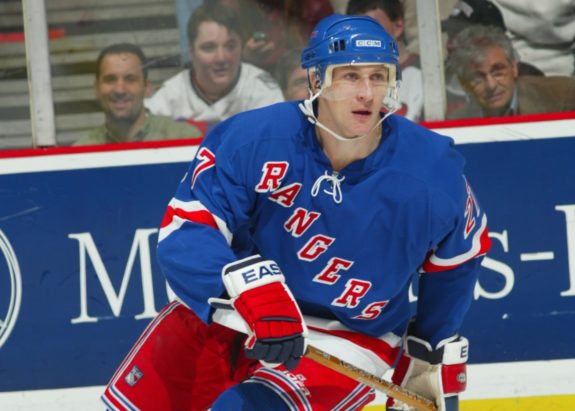
He represented the Rangers’ most ambitious foray into the available Russian talent pool that had been steadily expanding as the Soviet Union declined in the late 1980s and early 1990s: Kovalev was drafted 15th overall by the Rangers in 1991, becoming the first Russian-born and Soviet player to be selected in the first round of the NHL draft. Big and fast with a powerful wrist shot and outstanding passing skills, Kovalev – the top-ranked European in his draft class – was going to be New York’s Sergei Fedorov, the star Russian center who had arrived in the NHL the previous season and dazzled with the Detroit Red Wings.
While the road out of the Soviet Union to North America for some stars such as Fedorov, Slava Fetisov and Alexander Mogilny had been considerably tougher just a few years before, Kovalev represented a new wave of Russian players who were free to join the NHL almost immediately. Eager to tap the skills Russians had displayed in their then-limited time in North America, the Rangers hoped they were getting a superstar who only needed some polishing before unleashing his talent at Madison Square Garden.
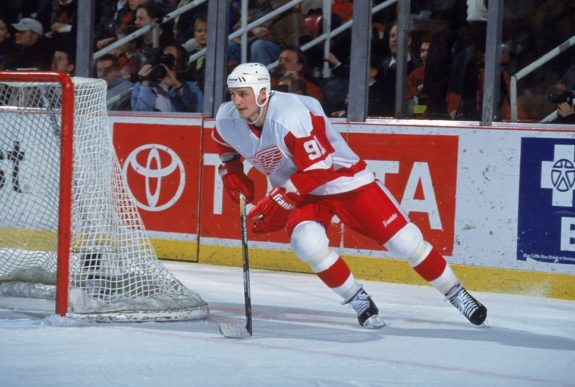
Kovalev certainly appeared to be on his way in 1992-93, making his NHL debut with 20 goals and 18 assists in 65 games. He upped his totals to 23 goals and 33 assists and 76 games in 1993-94, while playing with an edge that belied a happy-go-lucky nature around teammates. Kovalev racked up a stunning 154 penalty minutes that season and had 11 seasons in which he reached 70 or more.
Related: Alexander Mogilny – The Great Russian Enigma
The events of the spring of 1994, of course, are what cemented Kovalev’s place in New York sports lore. Unfazed by the enormity of the Rangers’ quest to end a 54-year Stanley Cup drought, he delivered 21 points in 23 postseason games – with his brilliant far-post shot past the New Jersey Devils’ Martin Brodeur in Game 6 of the Eastern Conference Final sparking the Blueshirts’ comeback from the brink of elimination. That goal proved as important as any in the club’s run to the long-awaited title.
Kovalev’s Star in New York Began to Fall
The Rangers had a championship, and in their minds, a superstar-in-waiting. Kovalev joined teammates Sergei Nemchinov, Sergei Zubov and Alexander Karpovtsev as the first Russians to have their names engraved on the Stanley Cup. Kovalev’s future as a Ranger looked bright and exciting, fans eager to watch his oft-breathtaking talent carry him to new heights. That he clearly enjoyed America and New York City, the kid who grew up under the restrictions of the Soviet Union, made Kovalev all the more appealing to fans who saw a future cornerstone for the Blueshirts.
“The cultural differences interest me; they don’t scare me,” Kovalev said then. “Here, you choose your own lifestyle.” (From ‘Rangers’ Kovalev is Fast Becoming Americanized’, New York Times, 9/16/92)
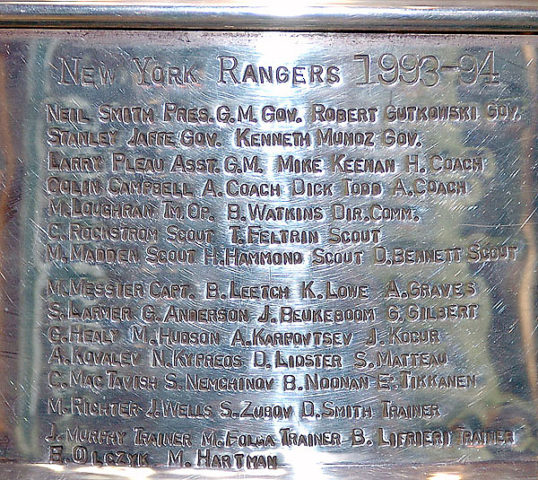
Yet the anticipated breakout didn’t happen in the lockout-shortened 1994-95 season, when Kovalev posted 13 goals and 15 assists in 48 games. He recorded a career-high 58 points on 24 goals and 34 assists in 1995-96, yet was limited by injury to 45 games and 35 points the following season.
Related: The Best Nicknames in Hockey
With memories of the Stanley Cup season fading, some frustration with Kovalev was building within the organization – especially for coach Colin Campbell, who had taken over after Mike Keenan’s unceremonious departure. Kovalev’s play could be absolutely maddening for coaches and fans alike – one shift he would seem to coast, largely uninvolved and seemingly not paying attention, the next he would dominate play with his strength and speed and deft stickhandling.
Unable to make the quantum leap the Rangers expected he would, Kovalev’s coachability and work ethic came into question. An unfair stereotype applied to Russian players at the time – that unshackled from the military-like training programs of the Soviet system, they had become lazy amidst their newfound freedom – was thrown around. He was accused of being a “diver” who faked injuries.
Kovalev delivered 23-goal, 30-assist seasons in 1996-97 and 1997-98, yet the Rangers had become disillusioned with him, perhaps believing that he had hit his ceiling and that stardom wasn’t in the cards. 14 games into the following season, they gave up, trading the 1994 playoff hero to the Pittsburgh Penguins with Harry York for Petr Nedved, Chris Tamer and Sean Pronger.
Trade to Penguins Lifted Kovalev to New Heights
The end of his first Rangers tenure and the change of scenery either suited Kovalev or woke him up – or both. He recorded 20 goals and 26 assists in 63 games for the Pens in 1998-99, then delivered five goals and seven assists in 10 playoff games that spring, further establishing a career-long trend of postseason success. Kovalev totaled 100 points in 123 playoff contests.
He posted a career-best 66 points in 1999-00, but the Rangers Regret Tour really got into full swing over the following three seasons. Kovalev recorded 95, 76 and 77 points during that time, blossoming into the offensive force the Blueshirts believed he would.
Related: The Best 50-Goal Season
It’s worth noting that Kovalev played with Jaromir Jagr and Mario Lemieux in Pittsburgh, who are known for having quite the positive impact on teammates’ point totals. However, while Kovalev’s 95-point performance in 2000-01 complemented Jagr’s 121-point effort, his 76 points led the club in 2001-02, when Jagr had departed for the Washington Capitals and Lemieux played only 36 games. Lemieux was healthy and totaled 91 points in 2002-03, while Kovalev was second on the team with 64 points in 54 games before his second go-round in New York began.
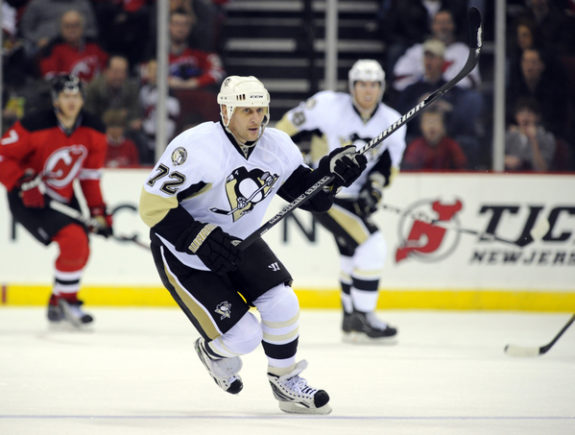
Blueshirts management wanted a mulligan after watching Kovalev pile up 171 points in the first two of those full seasons with the Penguins. It got one in February 2003, when cost-cutting Pittsburgh traded Kovalev back to New York in an eight-player deal. He recorded 10 goals and 3 assists in 24 games with the Rangers that season, giving him the 77 points and a three-season stretch in which he averaged more than a point per game.
The second engagement on Broadway was going to be different, with a more mature and in-his-prime Kovalev back where he belonged.
Right? Well … no.
Act 2 lasted all of 66 more frustrating games the following season. Kovalev was clearly unhappy and it showed in his deteriorating game. The fans turned on him, booing him consistently. The reunion was a mistake, not at all meant to be. Perhaps it never was for the Rangers and Kovalev.
Then-general manager Glen Sather mercifully traded him to the Montreal Canadiens for prospect Jozef Balej and a second-round pick March 3, 2004.
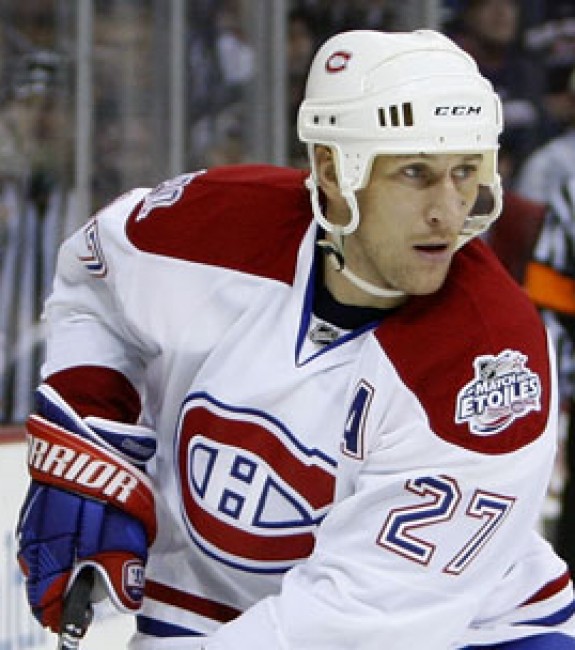
“New York is about big players and star names, and it seemed whatever I tried didn’t work,” Kovalev said then in a telling quote. “Nothing worked. I wish it did. I wish I did a better job.” (From ‘Rangers Trade Kovalev to Habs’, New York Post, 3/3/04)
The experience was a sad one for all involved, a forgettable final chapter in the place where it all began for Kovalev, where he appeared to be anything but overwhelmed and out of his element on the big stage during that magical spring of 1994.
Another Trade from Rangers, Another Resurgence
The story might have been even more disheartening had that failed reunion marked the end for Kovalev. Perhaps exasperatingly for the Rangers, that turned out not to be the case.
Kovalev recorded only a goal and two assists in 12 regular-season games for the Canadiens that season, but his playoff self emerged again, with six goals and four assists in 11 postseason games. Given their first experience of trading him away, perhaps the Rangers should have known what was to come.
Though injury struck again in 2005-06, limiting him to 69 games, Kovalev recorded 65 points. He followed that up with a Rangers-like season in 2006-07, when he managed only 47 points and a minus-19 rating in 73 games.
The ensuing bounce-back, though, probably would have never occurred in a Rangers sweater. Kovalev’s 35 goals and 84 points in 2007-08 were the second-best totals of his career, while his 49 assists were a career-best. Then 34 years old, his plus-18 rating tied a career-high.
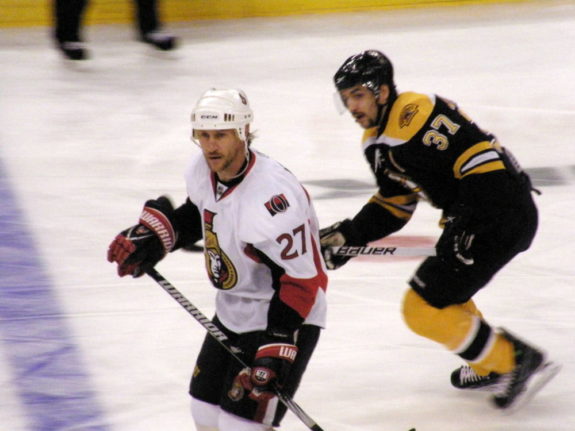
One more outstanding season followed, another 65-point effort for Montreal in 2008-09 that of course saw him add 11 points in 12 playoff games. Signing for two years with the Ottawa Senators in the offseason, he would record 36 goals and 52 assists for them and two other teams over the final four seasons of his career – one of them a short-lived reunion with the Penguins in 2011 – and had a career-best four-goal game Jan. 3, 2010, for the Sens.
Kovalev finished with 430 goals and 599 assists over a 19-year NHL career. For the Rangers, those totals had to be more than just a little bit painful.
It’s impossible to say why Kovalev never found sustained success in New York. He wasn’t imported from another team, the kind of move that hinders so many others unaccustomed to the white-hot spotlight of Gotham; he was drafted and brought along by the Rangers, then starred as they authored one of the great moments in NHL history.
Kovalev’s Rangers Struggles Likely to Remain a Mystery
That makes Kovalev’s underachievement in New York all the more confusing. Did the expectations of stardom there grow too heavy, the spotlight too bright – which he perhaps alluded to after being sent away for the second time? Did he feel overshadowed and unappreciated? Did Rangers’ coaching efforts fail to get through to him in the way such efforts seemed to in Pittsburgh and Montreal, or was Kovalev’s perceived stubbornness somehow more prevalent in New York?
Perhaps we’ll never know. Perhaps it was a combination of several of those factors. Here’s what we do know: Kovalev recorded seven seasons of 60 or more points and four of at least 70. None of them came with the Rangers.
So can Kovalev be classified as One That Got Away from the Blueshirts? There might be enough evidence to say no. The extensive body of work that included a second stint on Broadway suggests that he simply wasn’t going to thrive long-term with the Rangers – despite the cruel irony that he largely developed into the player they believed he would become on draft day in 1991.
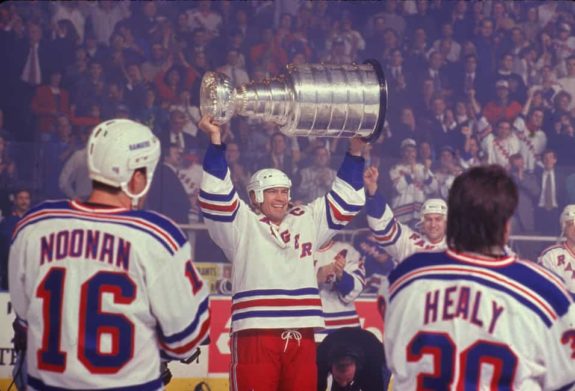
Instead, Kovalev’s legacy in a Blueshirt is boiled down to the spring of 26 years ago and maybe ultimately, a single moment: The near-perfect shot that eluded and then unsettled Brodeur and the Devils, cutting the Rangers’ Game 6 deficit to 2-1 after two periods and setting the stage for Mark Messier’s hat trick that propelled them past New Jersey and eventually, to the Stanley Cup.
Given what that goal at that time ended up meaning to the Rangers and their fans, that might be enough.
The post Kovalev and the Rangers: Eventful, Successful and Disappointing appeared first on The Hockey Writers.
Popular Articles

















































 Blackhawks Chicago
Blackhawks Chicago Panthers Florida
Panthers Florida Penguins Pittsburgh
Penguins Pittsburgh Rangers New York
Rangers New York Avalanche Colorado
Avalanche Colorado Kings Los Angeles
Kings Los Angeles Maple Leafs Toronto
Maple Leafs Toronto Bruins Boston
Bruins Boston Capitals Washington
Capitals Washington Flames Calgary
Flames Calgary Oilers Edmonton
Oilers Edmonton Golden Knights Vegas
Golden Knights Vegas Flyers Philadelphia
Flyers Philadelphia Senators Ottawa
Senators Ottawa Lightning Tampa Bay
Lightning Tampa Bay Red Wings Detroit
Red Wings Detroit Islanders New York
Islanders New York Sabres Buffalo
Sabres Buffalo Devils New Jersey
Devils New Jersey Hurricanes Carolina
Hurricanes Carolina Stars Dallas
Stars Dallas Jets Winnipeg
Jets Winnipeg Blue Jackets Columbus
Blue Jackets Columbus Predators Nashville
Predators Nashville Wild Minnesota
Wild Minnesota Blues St. Louis
Blues St. Louis Mammoth Utah
Mammoth Utah Ducks Anaheim
Ducks Anaheim Sharks San Jose
Sharks San Jose Canucks Vancouver
Canucks Vancouver


